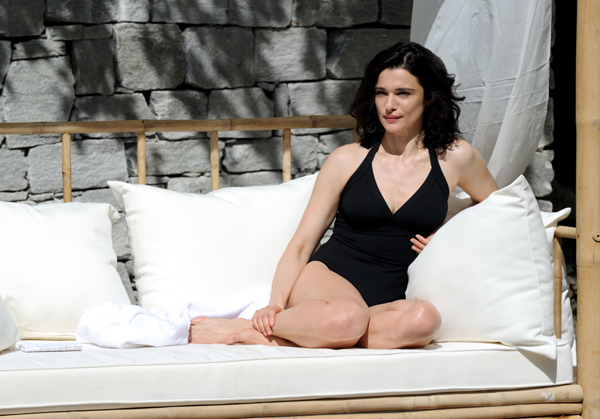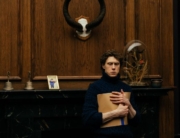Don’t be fooled by the European poster for Paolo Sorrentino’s latest amorphous film. It may be hard to pin down what type of movie this is, but it’s definitely not the spry sex comedy hinted at in the ad campaign, where stars Michael Caine and Harvey Keitel sit in a swimming pool staring gob-smacked at the completely nude woman, Miss Universe, no less, stepping into the waters, her backside in full display. (That one-sheet successfully hints at the film’s array of arresting visuals.) The gents are not cuddly, grumpy, horny old men, as one might assume. In fact, the two have given up the chase, though there are other older men here who seek out youthful companionship—and willingly pay for it. If there is one sentiment sauntering in and out of this ship-shifting film, it is one of regret or resignation.
As in his Oscar-winning The Great Beauty, Sorrentino throws a lot of ideas at the screen, though his new film is not as densely loaded, and some themes stick more than others. Like Beauty, Youth is linear and allusive, indulging in luscious and trippy imagery, made by a director who conveys more visually than through dialogue. Yet the screenplay has bite and a well-rounded ensemble, though Sorrentino doesn’t always finish what he’s started. (One storyline comes to an abrupt end, wrapping up as though the producers were about to pull the plug.)
The direct dialogue dispels the rarefied air of its principal setting, an Old World Swiss Alps resort where retired British conductor Fred Ballinger (the statesmanlike Caine) has been retreating for 20 years. In a self-imposed cocoon, he has refused for personal reasons to accede to Queen Elizabeth II’s request for a concert commemorating his investiture that would feature his most noted composition. He’s joined at the dinner table and poolside by his longtime friend, film director Mick Boyle (Keitel), who, like Fred, is approaching his eighties. Their exchanges begin with Mick mocking, “Did you take a piss today,” and go on to weightier, more self-aware issues. The main difference between the two: Fred doesn’t find life interesting; Mick, on the other, still has a career ambition and competes with the works he made in his younger years.
The two have another bond: they were both in love with the same woman 60 years ago (Mick can’t remember if he slept with her), and, more crucially, Mick’s son is married to Fred’s only child and his assistant, fortyish Lena (Rachel Weisz), until she’s dumped for a young British pop star, played by big-in-Europe singer Faith Paloma. (Though she’s the Other Woman, the mistress helpfully clarifies to all that “I’m not a whore, I’m a singer.”) Lena serves as the voice of emotional intelligence, calling Fred out as a victim of his own apathy and for his infidelity; her mother long ignored Fred’s string of affairs. Sorrentino’s script is a gift for the actress; Weisz delivers this year’s version of Emma Stone’s Birdman monologue, a nonstop spewing of indignation.
Meanwhile, Mick orchestrates his comeback, after having hit his stride 40 years earlier. For his cinematic “last testament,” a project entitled Life’s Last Day (Mick’s looking ahead indeed), he courts his former flame, Brenda Morel, the Trilby to his Svengali, whom he has known for 53 years. Brenda is played by Hollywood royalty and a star of New Hollywood, Jane Fonda, who embraces playing against type in what is perhaps her crudest role. The tough-talking Brenda, born dirt poor, is preserved in time, bejeweled in flaming canary yellow with a mask of makeup. Wearing a white-blond bouffant hairstyle, she looks as though she has stepped out of a time capsule. Yet she’s the most forward thinking of the lot, proclaiming the damning line “TV is the future and the present,” and the other most shocking line uttered during the Cannes Film Festival, where the film premiered: “Life goes on even without all of that cinema bullshit.” Fonda does more here in her one confrontation with Keitel than she has in the last 25 odd years in film or in her current, rather placid Netflix series, Grace and Frankie. (Life mimicking art?)
It’s Luca Bigazzi’s cinematography that will linger, such as a dream-turned-nightmare sequence where Miss Universe saunters scantily clad down a catwalk in a flooded Saint Mark’s Square in Venice, her reflection and the lights simmering in the water. Those who plop down $14 for the big-screen experience will not be disappointed by the assorted eye candy. It’s a reminder of the experience a widescreen film with a sumptuous production design can offer, belying Brenda’s belief that the future of storytelling lies in television and not the cinema.
Sorrentino abruptly transitions from scene to scene through a sound cue or a change of pace. At times, viewers won’t know what hit them or why the camera stays focused on the slow-mo workouts of a teenage hotel staff member, however strangely mesmerizing. The score ranges from vibrating bass Brit pop to contemporary classical, featuring a beautiful piece sung by the too-little seen-or-heard soprano Sumi Jo. The film takes Fred’s side, who at one point says, “You don’t need words or experience to understand music.”
The camera’s roving attention span carries over into the writing, with the script giving Caine’s character more time to grow but shortchanging Keitel. Still, the filmmaker melds memory, loss, comedy, and tragedy, and the variation in styles makes the two-hour running time fly by—one scene is touching, the next raucous; a languid sequences butts heads with an excursion into a rat-a-tat-tat music video. The tonal shifts give off a charge to the compilation of themes. Though not as epic as The Great Beauty’s attempt to capture the soul of Italy, Youth is more intimate.








Leave A Comment